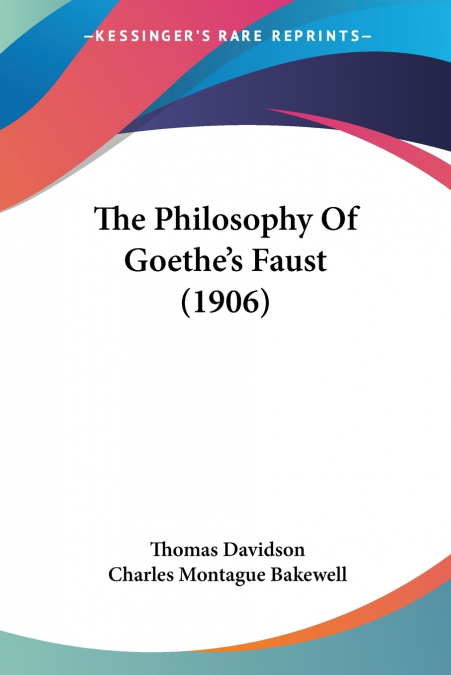
 Librería Perelló (Valencia)
Librería Perelló (Valencia)
 Librería Aciertas (Toledo)
Librería Aciertas (Toledo)
 El AlmaZen del Alquimista (Sevilla)
El AlmaZen del Alquimista (Sevilla)
 Librería Elías (Asturias)
Librería Elías (Asturias)
 Librería Kolima (Madrid)
Librería Kolima (Madrid)
 Donde los libros
Donde los libros
 Librería Proteo (Málaga)
Librería Proteo (Málaga)
The Philosophy of Goethe’s Faust is a book written by Thomas Davidson and published in 1906. The book is a detailed analysis of Johann Wolfgang von Goethe’s famous play, Faust, and its underlying philosophical themes. Davidson examines the play’s exploration of the nature of human existence, the search for knowledge and truth, and the struggle between good and evil.Davidson’s analysis of Faust is grounded in his understanding of German Idealism, a philosophical movement that emerged in the late 18th century and was influential in Goethe’s time. He explores how Goethe’s ideas about the relationship between the individual and the universe, and the role of reason and intuition in human understanding, are reflected in the play.The book is divided into three parts, each focusing on a different aspect of Faust. Part one examines the character of Faust and his quest for knowledge and fulfillment. Part two explores the character of Mephistopheles and his role in Faust’s downfall. Part three looks at the play’s resolution and its message about the nature of human existence.Throughout the book, Davidson draws on a wide range of philosophical and literary sources to illuminate Goethe’s ideas and their significance. He also provides a detailed analysis of the language and imagery used in the play, showing how they contribute to its philosophical themes.Overall, The Philosophy of Goethe’s Faust is a comprehensive and insightful exploration of one of the most important works of German literature. It will be of interest to anyone interested in the history of philosophy, literature, or German culture.This scarce antiquarian book is a facsimile reprint of the old original and may contain some imperfections such as library marks and notations. Because we believe this work is culturally important, we have made it available as part of our commitment for protecting, preserving, and promoting the world’s literature in affordable, high quality, modern editions, that are true to their original work.